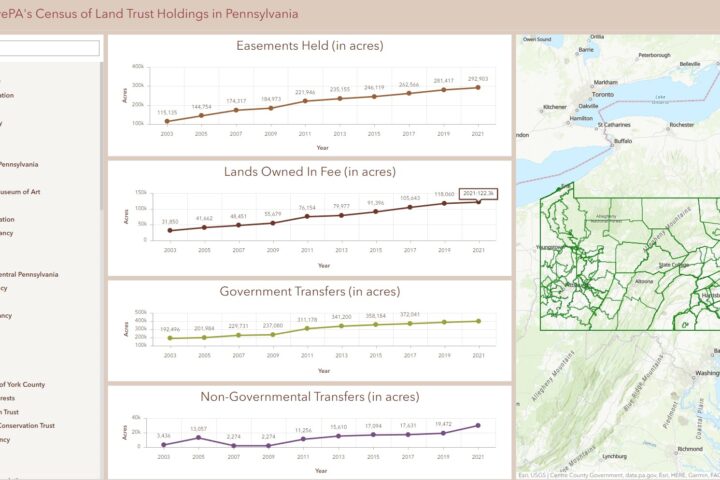i2 Capital announced today that the pilot Revolving Water Fund in the Brandywine-Christina watershed closed two additional partnership agreements with Pennsylvania townships. East Marlborough and Kennett townships approved working with the Revolving Water Fund to expand upstream investment in the surrounding rural watershed to achieve water quality improvements that comply with mandates from the Pennsylvania Department of Environmental Protection. These agreements follow an agreement with the City of Newark, Delaware, announced in April 2020.
“The scale of conservation challenges around the world requires the environmental community to explore new and innovative models to conservation finance,” said Maria Dziembowska, Delaware Conservation Director of The Nature Conservancy. “Projects like the Brandywine-Christina Revolving Water Fund are a great example of how private-public partnerships can advance our collective efforts to improve the health of our lands and waters.”
The Revolving Water Fund, developed through a partnership between i2 Capital and The Nature Conservancy in close collaboration with Stroud Water Research Center and the University of Delaware Water Resources Center, aims to provide a self-sustaining pool of capital for watershed conservation. The Revolving Water Fund was created to provide municipalities, water utilities, corporations, and public stakeholders with opportunities to purchase quantified pollutant reductions from on-farm agricultural restoration activities to achieve regulatory, supply chain, and/or public benefit objectives.
“Our partnership with The Nature Conservancy and other key contributors to create this innovative freshwater conservation model is a result of significant investments made by the William Penn Foundation and the NRCS Conservation Innovation Grants program,” said Ashley Allen, CEO of i2 Capital. “This is the first freshwater conservation funding mechanism of its kind. In the global water sector, less than three percent of more than $300 billion in annual global water market investments goes toward funding nature-based solutions. The Revolving Water Fund serves as a catalyst that integrates key stakeholders to make that happen.”
The Revolving Water Fund aligns Environmental Protection Agency Clean Water Act compliance with science-based investment in agricultural best management practices on farms that reduce nutrients and sediment flowing into surrounding waterways. The solution provides a powerful compliance-based anchor for effective nature-based water quality management. This anchor, in turn, provides foundational support for strategic purchase of quantified pollution reductions by corporate and public interests to achieve pressing natural resource management agendas. An increasing body of case studies and scientific analysis supports aggressive investment in agricultural best management practices as a key component of water and climate solutions.
“The United States Department of Agriculture’s Natural Resources Conservation Service (NRCS) Conservation Innovation Grants were created to support the development of innovative technologies and approaches to private land conservation to inspire creative problem-solving,” said NRCS Acting Chief Kevin Norton. “The Revolving Water Fund holds the promise of scaling up on-farm conservation activities that complement NRCS’s work with farmers in Pennsylvania. This validates the vision and purpose of Conservation Innovation Grants – to serve as competitive grants that drive public and private sector innovation in resource conservation.”
The agreements with East Marlborough and Kennett townships demonstrate an innovative “pay-for-success” financing technique whereby the upfront costs of installing conservation practices are paid by the Revolving Water Fund. Each participating municipality repays those costs only upon achievement of regulatory approval.
The approach shifts regulatory compliance risk from the municipality to conservation funders and allows for innovation in regulatory protocols, while supporting science-based water quality approaches. By demonstrating the efficacy of this model, the Revolving Water Fund seeks to create a replicable funding mechanism that other municipalities can readily adapt to advance the use of natural infrastructure as a stormwater management solution.
“The Revolving Water Fund is an important strategy to scale up the regional Delaware River Watershed Initiative,” said Clare Billett, Senior Program Officer of Watershed Protection at the William Penn Foundation. “By aligning watershed stewardship across public, private, and philanthropic sectors, we advance a critical common conservation agenda for these townships, as well as their many neighboring communities in the watershed.”
“This is a big idea that came to fruition with the strong support of many key constituencies,” said Richard Jones, former Director of TNC-Delaware and Senior Strategic and Legal Advisor to the project. “The Fund invites agricultural producers, conservation experts, municipalities, regulators, and conservation investors to the table at a critical time in the evolution of integrated watershed management approaches. We’re excited to expand and adapt the Revolving Water Fund model in adjacent communities and watersheds.”



